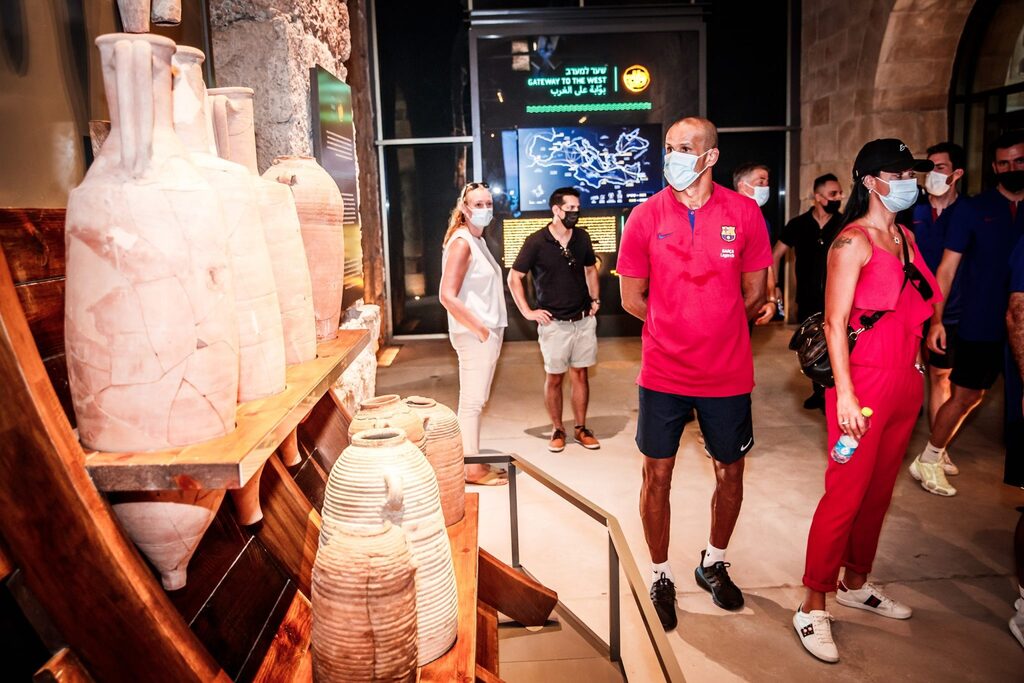With Prime Minister Naftali Bennett still to finalize regulations regarding entry for overseas visitors as the coronavirus surges again across Israel, a limited number of groups of foreign nationals continue to enter the country via educational programs and as members of parliamentary delegations, as part of a Tourism Ministry pilot program.
Individual tourism, however, remains off the table for now, leaving tour operators wondering when their livelihoods will return.
4 View gallery


Members of the French National Assembly and Senate visit an Iron Dome missile defense battery in southern Israel, July 19, 2021
(Photo: Hanan Bar Assouline/ELNET)
A spokesperson for the ministry said that only about 1,500 tourists are scheduled to visit Israel by the end of July under the pilot project.
While the first 20 groups arrived in June under a lottery system, subsequent groups of between five and 30 vaccinated persons can be brought into the country by any tour operator, as long as they meet the criteria set by the Health and Tourism ministries.
“Most of the groups originated in the U.S., with others coming from Europe, the UK and South America,” the Tourism Ministry said.
“Many, but not all, of the tourists arriving in groups are Christian pilgrims, with others coming for sightseeing and leisure touring.”
As of Monday, there were eight groups from North and South America traveling in Israel.
Non-tourist groups are also continuing to enter the country in accordance with government guidelines.
Among these was a party of some 40 members of the French parliament who made their way to Israel for a three-day visit on July 19, in an initiative of the European Leadership Network (ELNET), a nonpartisan NGO, in cooperation with the Foreign Ministry in Jerusalem.
“The purpose of the trip was first to meet the new government,” said Pierre-Henri Dumont, a member of the Foreign Affairs Committee in the French National Assembly.
“For me, it was the third time I was coming here to Israel. And it was to find out how things have changed since the Abraham Accords [normalizing relations between Israel and four Arab countries]. I mean, that’s a huge game-changer in the conflict in the Middle East.”
Dumont described his experience of entering the country during the pandemic as “more difficult [than before the pandemic]. Obviously, we had to run some tests, but the Israeli health professionals were actually very efficient.”
The need to revitalize tourism has become a urgent issue for Israel’s economy.
A Tourism Ministry spokesperson said that the limits on incoming tourism have had a "devastating effect" on the Israeli industry.
Whereas 2019 was a record-breaking year, with inbound travelers creating over 200,000 jobs and adding NIS 22 billion (around $6.7 billion) to Israel’s economy, the spokesperson acknowledged that “the continuing spread of coronavirus in 2021 will severely impact on employment within the tourism industry.”
4 View gallery


Participants in a reent trip to Israel by the Center for Latino-Jewish Relations at the Jordan River
(Photo: Courtesy of the Center for Latino-Jewish Relations)
As for the government’s tourism budget, the ministry said that it “continues to function within the parameters of the last budget passed in Israel" in 2019.
In the meantime, the ministry continues to market Israel as a healthy and desirable travel destination, while taking “the opportunity to develop and upgrade tourism infrastructure, in preparation for the re-opening of Israel’s incoming tourism industry.”
The Tourism Ministry said: “With morbidity rates rising in Israel and around the world due to the delta variant, discussions are continuing with the relevant government ministries regarding an opening date for incoming individual tourism. An announcement will be made when relevant.”
For tour operators and other business owners relying on incoming tourism, the announcement appears to foreshadow further postponement of Israel’s reopening date.
“We do incoming tourism, so basically we wait for the skies to be open. We don’t have any domestic tourism [clients],” said Oksana Mats from Bein Harim Tourism Services.
For those relying on incoming tourism, there is scant relief until the country reopens, and business is practically nonexistent.
Mark Feldman, the director of travel consultancy Diesenhaus BTC’s Jerusalem office, said: “We’re 70% down [from 2019]. In other words, it’s a massive decrease both in ingoing and outgoing [tourism].”
4 View gallery


The Tourism Ministry hosts a tour of ancient Caesarea for a group from Barcelona football club, July 19, 2021
(Photo: Oded Karni)
Prospects for tour operators were rendered even worse with the announcement that as of July 23, Spain and Kyrgyzstan will be added to the list of countries banned for travel. Other nations currently under travel ban are Argentina, Belarus, Brazil, India, Mexico, Russia, South Africa and Uzbekistan.
Additionally, 15 countries were listed as high risk on July 16, meaning that tourists entering from those nations must isolate upon arrival in Israel, regardless of whether they have been vaccinated or are recovered from the virus. On July 23, 11 additional countries will be added to this list, including Britain, Cyprus and Turkey.
Yet for non-tourist groups such as the French delegation, the largest to arrive in Israel since the outbreak of COVID-19, business continues as usual.
Article written by Felice Friedson and Aron Rosenthal. Reprinted courtesy of The Media Line


